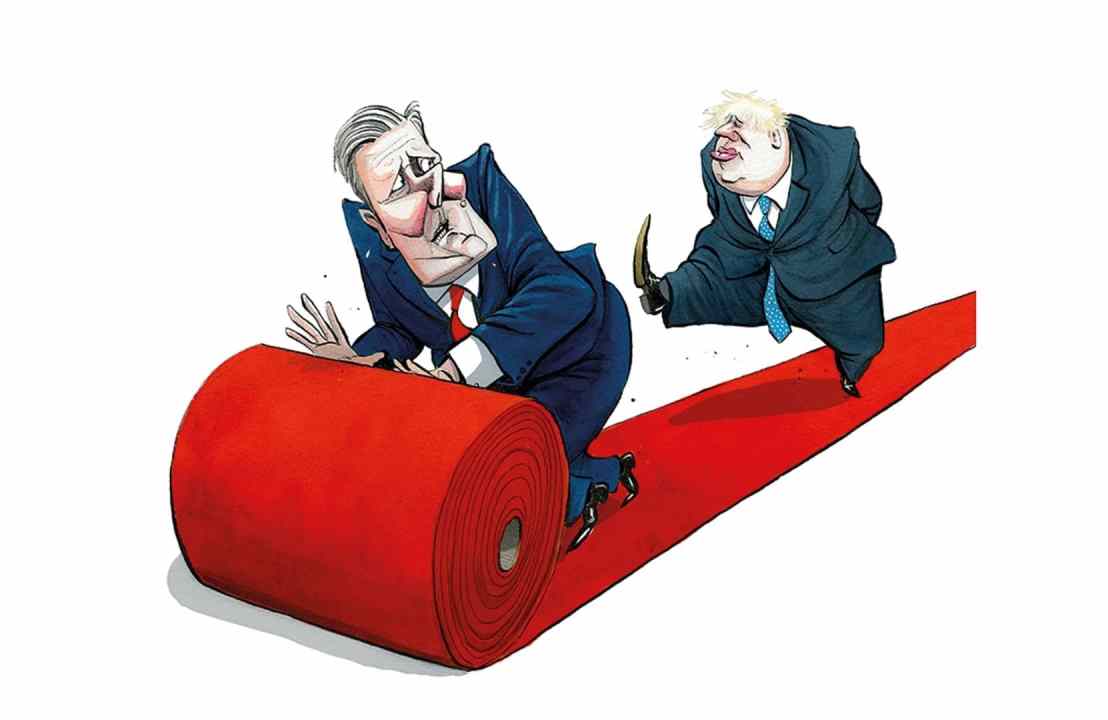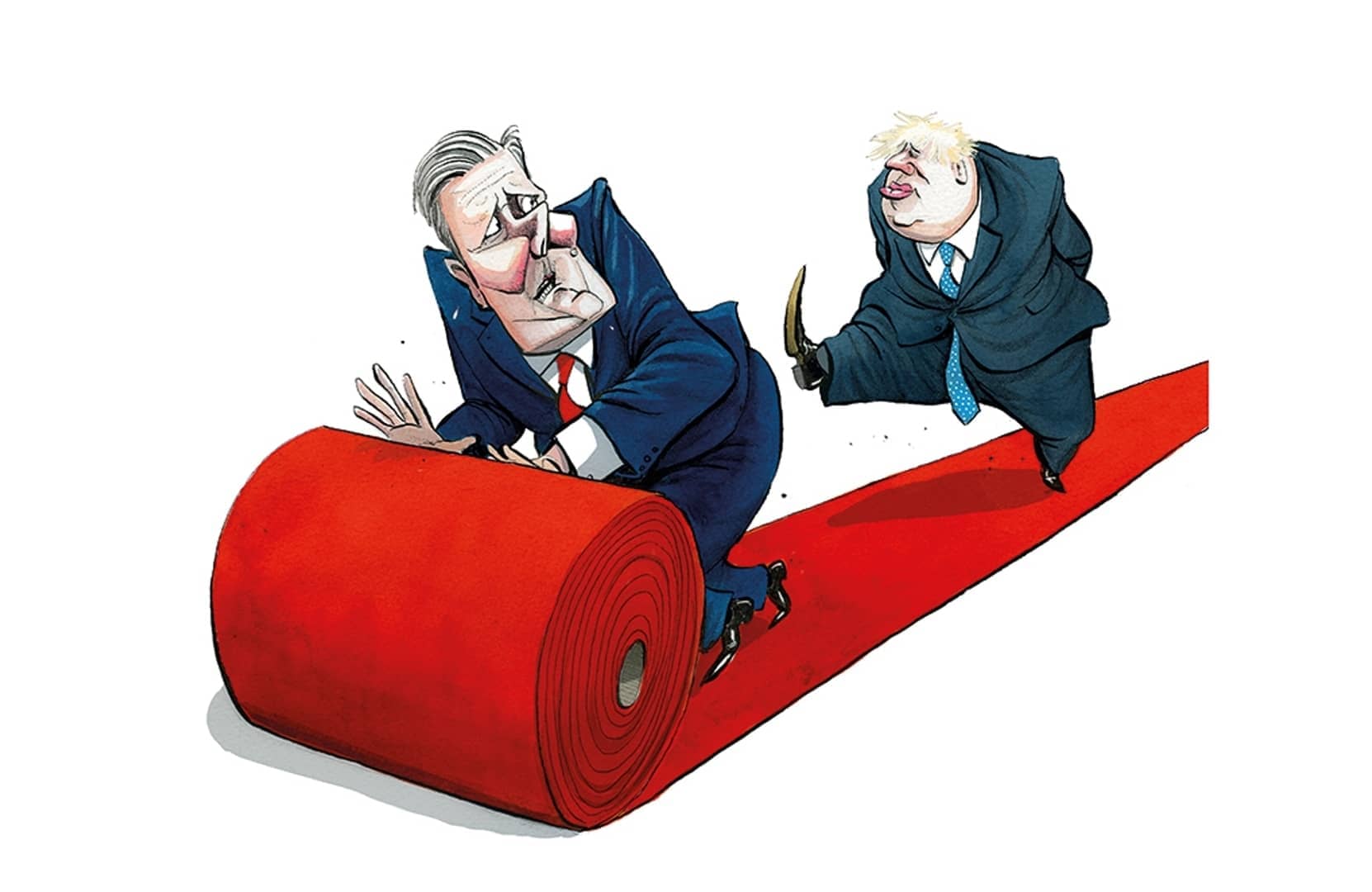Boris Johnson has a lot of people to thank for his survival in 10 Downing Street, but Keir Starmer should be at the top of the list. The Labour leader whipped his MPs to side with the government when lockdown votes looked tricky. Labour even saved Johnson from a defeat in the Commons over vaccine passports. But Starmer’s greatest service came last month, on a day that could have finished Johnson for good.
Members of the 2019 crop of Tory MPs had met to discuss their problems with the Prime Minister. The scene was set for an old-fashioned Conservative regicide. But just as senior Tories began to tell journalists that a confidence vote was imminent, the Labour party announced that Christian Wakeford, a Red Wall MP, had crossed the floor. The defection triggered the Tories’ tribal instincts and they rallied behind their leader. The immediate threat to Johnson subsided.
This moment seemed like another own goal from Starmer. Why blow a chance to dethrone a Tory Prime Minister? The answer is that, for now at least, a wounded Boris Johnson suits Labour better than a new leader would. ‘It’s a truism in politics that defections unite,’ says one Starmer ally, suggesting that Labour whips were all too aware that the move would have a rallying effect. ‘The ideal scenario is Boris stays on and damages the Tory brand and then whoever replaces him eventually is too tainted to appear fresh and new,’ adds another senior Labour figure.

The past few months have offered plenty of evidence that a beleaguered Johnson is good news for Labour. Since things started to go wrong for the Prime Minister, first because of his mishandling of the Owen Paterson affair and then partygate, Starmer’s prospects have improved. Even now, as Johnson shows small signs of a comeback, Labour has an average poll lead of six points.
Starmer has always said his party has had a ‘mountain to climb’ since the 2019 election defeat. Even the current polling has been met with scepticism. It’s not just an institutional reluctance to trust good news (Tony Blair only believed his 1997 election victory would happen at the very last minute and was planning to enter coalition talks with the Liberal Democrats). One Labour figure privy to internal focus groups warns that although the party is ahead in the polls, Starmer is not popular with the public. ‘People are anti-Tory and they’re tired — but they don’t have much affection for us.’
A wounded Boris Johnson suits Labour better than a new leader would
After the Jeremy Corbyn years, Labour still has reputational repairs to do, especially regarding foreign affairs. Voters have become used to seeing Labour on the wrong side of almost any dispute. During the Salisbury poisonings — when Corbyn and his team refused to condemn Russia and suggested that a sample of the Novichok used should be sent to Moscow so that the Kremlin could say whether it was theirs or not — Starmer, then shadow Brexit secretary, broke rank and publicly backed Theresa May’s response in a television interview.
Starmer is using the Ukraine situation this week to emphasise Labour’s return to the centre. He recently reaffirmed Labour’s support for Nato and distanced himself and his party from the Stop the War coalition that Corbyn so keenly advocated. Starmer described the group’s members as ‘not benign voices for peace’.
‘We don’t expect to get lots of new voters because of Ukraine but it shows there is a Labour leader who is decent and respectable,’ says one Starmer ally. Corbyn could soon be out of the Commons. The former leader still has the whip suspended for saying that the scale of anti-Semitism in the Labour party during his leadership was exaggerated for political reasons. Until he apologises unequivocally, the whip won’t be reinstated. That logically means there will be a new Labour candidate for Islington North in the next election.
The bigger question is who the Tory leader will be for that election and whether things really would be worse for Labour if it wasn’t Johnson. It’s still not clear if Starmer knows how to attack Johnson successfully. If the Prime Minister is now mortally wounded, it wasn’t thanks to any onslaught from the opposition but because of his own self-inflicted injuries. Johnson was once the opponent Labour strategists feared most — now no one is sure who they fear.
One senior party figure likens Rishi Sunak to ‘David Miliband for the modern age’. ‘He wants to be PM but doesn’t want to stick the knife in,’ says one adviser. Labour believe Sunak can be attacked as a high-tax, low-growth Tory. The national insurance hike has long been viewed as a gift for Labour. ‘People only liked him because he spent money,’ says one shadow minister of the pandemic support packages. ‘And he’s stopped doing that.’
Members of the shadow cabinet take the view that part of what made Johnson such a tricky opponent to attack — particularly in 2019 — was his commitment to higher spending and net zero. If a candidate, such as Sunak or Liz Truss, were to come along who they could try to depict as pro-austerity and less committed to the green agenda, Labour would be able to fight an election on more traditional party lines.
This is why Jeremy Hunt — who many believe would keep net zero a key priority if he became the next Tory leader — is viewed by some Labour MPs as the trickiest potential opponent. However, other advisers believe it would be a simple fight. In the past two elections, the Tories have succeeded in making it harder for Labour to attack them over the NHS. If the longest ever serving health secretary were to succeed Johnson, old arguments would return, particularly if hospital waiting lists still haven’t started to go down.
Starmer’s team believe they can keep making gains in the polls as the cost of living crisis starts to take effect. But whether Starmer can become an electoral draw in his own right, as opposed to relying on the Tories’ misfortunes, is yet to be proved.








Comments